Framings and narratives are everywhere: in the news we watch, the social media we scroll through, the visuals we see, the knowledge we consume and the art we engage with. Because they are so pervasive, we get used to them and stop noticing how much they shape our thinking. In reality, they are shaped by broader cultural and political power structures, holding significant influence over public opinion, social behaviours, and direct political decisions.
Zionism, Israel and their enablers perpetuate false, harmful and dehumanising narratives across media, politics, development and aid, and arts and culture which negatively shape public opinion and international engagement, and directly impact Palestinians' lives and futures. Acknowledging, challenging and deconstructing these narratives is key to transforming power dynamics and amplifying Palestinian reality and agency.
We recognise that these narratives do not stand alone. They are interlinked, often reinforcing or overlapping with one another. At the same time, recognising their subtle differences allows us to address them more strategically. Many other variations exist but are not specifically included in this guide.
“There are two sides to every story”, or so we are told. Bothsides-ism refers to a communicator making a moral equivalence or assigning equal responsibility between two parties in an attempt to draw objectivity.
This framing appears across global struggles, but it deliberately ignores—rather than interrogates—the historical and structural power imbalance faced by oppressed peoples.
In the case of Palestine, one of the most prevalent narratives—reproduced across international media, politics, arts and culture, humanitarian and international organisations and even solidarity spaces—is that Palestinians are in an age-old “conflict” with Israelis, where “both sides” have equal claims to the same land, and share responsibility and blame for the absence of freedom, peace and justice. This skewed framing is a colonial concept that predates 1948, designed to justify the Zionist colonisation of Palestine. Within this logic, a flawed commitment to “balance” and “neutrality,” is upheld.
Manifestations of bothsides-ism include basing stories and thinking on the “Israeli-Palestinian conflict,” the “Arab-Israeli conflict,” and the “Israel-Hamas war”—all widely accepted internationally. It creates flawed understandings of Israeli policies and Palestinian actions. For example, within the “two-sided” narrative, Palestinian resistance is framed as “terrorism,” while Israeli aggression is portrayed as “self-defence.” Palestinian protests are depicted as “clashes,” whereas Israeli suppression is described as “dispersing rioters.”
Framing the reality as a “two-sided conflict” ignores the root causes of oppression against the Palestinian people, sweeping away the history of British colonialism, and Israel’s manifestation through settler-colonialism and apartheid. It undermines the Palestinian experience under an ongoing Nakba, characterised by continuous ethnic cleansing, genocide, persecution and systemic oppression.
By omitting these root causes, the situation is portrayed—at best—as a “dispute” that began with the military occupation of the West Bank and Gaza Strip in 1967. This framework is often analysed through international law as an armed conflict between two parties, within the paradigm of international humanitarian law—a legal system developed after World War II to regulate armed conflicts and reduce human suffering, not to end occupations or dismantle colonial systems.
In the Palestinian context, when taken in isolation, this framework conceals Israel’s broader, historical, and ongoing structures that underpin the colonial rule. It fragments Palestinians by focusing only on those in the West Bank and Gaza, ignoring that the settler-colonial project impacts all 15 million Palestinians; including the two million with Israeli citizenship who live as second-class citizens, and millions of refugees and deportees denied the right to return to their homeland.
This framing normalises territorial partition, entrenches fragmentation, and undermines Palestinians’ collective rights, including the rights to self-determination and return.
Bothsides-ism obscures the asymmetric power dynamics between a colonial power and the colonised people—one of whom is a nuclear power that exerts military control over the other.
Implying power symmetry means undermining people’s rights and universal principles, which are the only path to dignity and justice, including within communication and perception.
Bothsides-ism juxtaposes “Palestinian rights” with “Israeli security concerns,” rendering Palestinians’ rights to freedom, justice, return and self-determination conditional rather than inherent and inalienable. Palestinian resistance to oppression in this framing is delegitimised and criminalised, presented as “unhelpful for peace” or “extremist”.
Since October 2023, discussions around “violence” have framed resistance by the oppressed as driven by hostility, while Israeli violence is framed as “defensive”, legitimate and debatable. The attack by the Qassam Brigades on 7 October 2023 is decontextualised, and the continued genocide and ethnic cleansing of the Palestinian people is presented as a “tit-for-tat” response, therefore manufacturing consent for genocide and continued oppression.
Harmful ramifications of this narrative include upholding the flawed moral commitment to "balance" and "neutrality," based on the misguided premise that "there are two sides to every story" or that "both sides have committed crimes." Within this logic, policies and actions across political, academic, cultural, media and civil society sectors are confined within conflict-resolution, “peacebuilding” and false parity frameworks. Such approaches maintain the premise that if Israelis and Palestinians would engage—whether through formal negotiations, joint projects or individual interactions—there would be an end to what is perceived as a “dispute” and the so-called "divisions" would be overcome.
*Explore more on “false parity” in this section
Salem Barahemh deconstructs the “bothsides-ism” narrative
Source: Uncivilized Media
The “bothsides-ism” narrative is often overlaid with a religious or cultural dimension that distorts the reality of Zionist settler colonialism. It presents the situation as an ancient “dispute” between Arabs—typically reduced to “Muslims”—and Jews, alleging an intrinsic hatred rooted in religion, culture, ethnicity or civilisational foundations.
This framing falsely implies that all Palestinians and Arabs are Muslim, and that all Jews are Zionists. It reduces a political, colonial reality to a supposed religious “conflict.”
Media coverage framing 2021 protests in Palestine as “clashes” between Jews and Arabs.
Source: Voice of America
This narrative promotes the idea that this is a centuries-old, intractable issue—one that is far too complex to be resolved—based on opposing cultural or religious identities; rather than a colonial reality that was shaped by Western support for the Zionist movement and Jewish colonisation of the land of Palestine in the late 19th century.
Such framing validates harmful neo-conservative theories such as Huntington’s “clash of civilizations.” This perpetuates the status quo, promoting a harmful view of the world’s international relations and people’s struggle. It discourages urgent mobilisation to change the situation, as many assume it is too complex or sensitive to address. This mindset enables complacency and inaction regarding Israeli colonial expansion.
The narrative inaccurately portrays Palestinians as a homogenous Muslim group, ignoring centuries of religious plurality within Palestinian society. This carries racist and orientalist overtones, often overlapping with the “terrorist” narrative. Palestinians, swallowed by the general category of “Arab” or “Muslim,” are depicted as “backward, violent, terrorists,” positioned in opposition to Israeli Jews, who are framed as embodying European modernity and advanced “civilisation.” In turn, this fuels Islamophobia, anti-Arab racism and anti-Palestinian racism prevalent in the West.
Associating Judaism or the global Jewish community with a settler-colonial ideology ignores the fact that many Jewish individuals and groups worldwide reject Zionism and refuse to let oppression be carried out in their name. They emphasise the need to distinguish between anti-Zionism and antisemitism, asserting that Judaism is fundamentally incompatible with colonialism, apartheid and genocide.
Finally, portraying the situation as “religious strife” enables Israel, Zionists and supporters to smear and criminalise anyone opposing Israel and Zionism by labelling them antisemitic. This weaponisation does not suggest that the false narrative of a “conflict” between Muslims/Arabs and Jews is the cause of persistent antisemitism accusations, but reinforcing this narrative makes such arbitrary and systemic accusations easier to deploy.
*Explore more on smearing Palestinian advocacy in this section
The "humanitarian crisis" narrative is a Western-centric framing that obscures the colonial, capitalist and structural root causes behind political and socio-economic hardships among people in the global majority.
In the case of Palestine, this narrative—widely promoted by international development and aid organisations, media, political discourse and academic institutions—reduces the Palestinian struggle to issues of poverty, underdevelopment and famine, erasing the colonial reality behind it.
For example, the World Bank Assistance Strategy for the West Bank and Gaza 2022-25, attributes water shortages to the region’s climate, overexploitation and poor facilities; rather than ongoing Israeli colonisation, blockade, land theft, economic subjugation and deliberate exploitation and pollution of Palestinian natural resources. Similarly, during the ongoing genocide in Gaza, international organisations have persisted in framing the situation as a mere humanitarian catastrophe; despite overwhelming documentation of systematic Israeli destruction, obstruction of aid, deliberate use of food as a weapon of war, and even direct attacks on aid organisations and workers.
Within this narrative, Palestinians are often depicted as passive “recipients” of aid, portrayed as underdeveloped, uneducated, poor and in need of external salvation or intervention. This approach disproportionately highlights women, children and groups perceived as marginalised, such as Bedouins and refugees.
The majority of respondents of our online survey (64%) are dissatisfied/very dissatisfied with the way Palestinians are portrayed by international aid agencies and NGOs.
In both the focus groups and the online survey, participants highlighted the harm in narratives portraying Palestinians as poor, dirty and helpless, especially when it comes to children, as well as narratives that exhibit development organisations and their international staff as “white saviours”.
Palestinian participants rated the following three images as the most harmful images commonly disseminated by those working in the development sector:
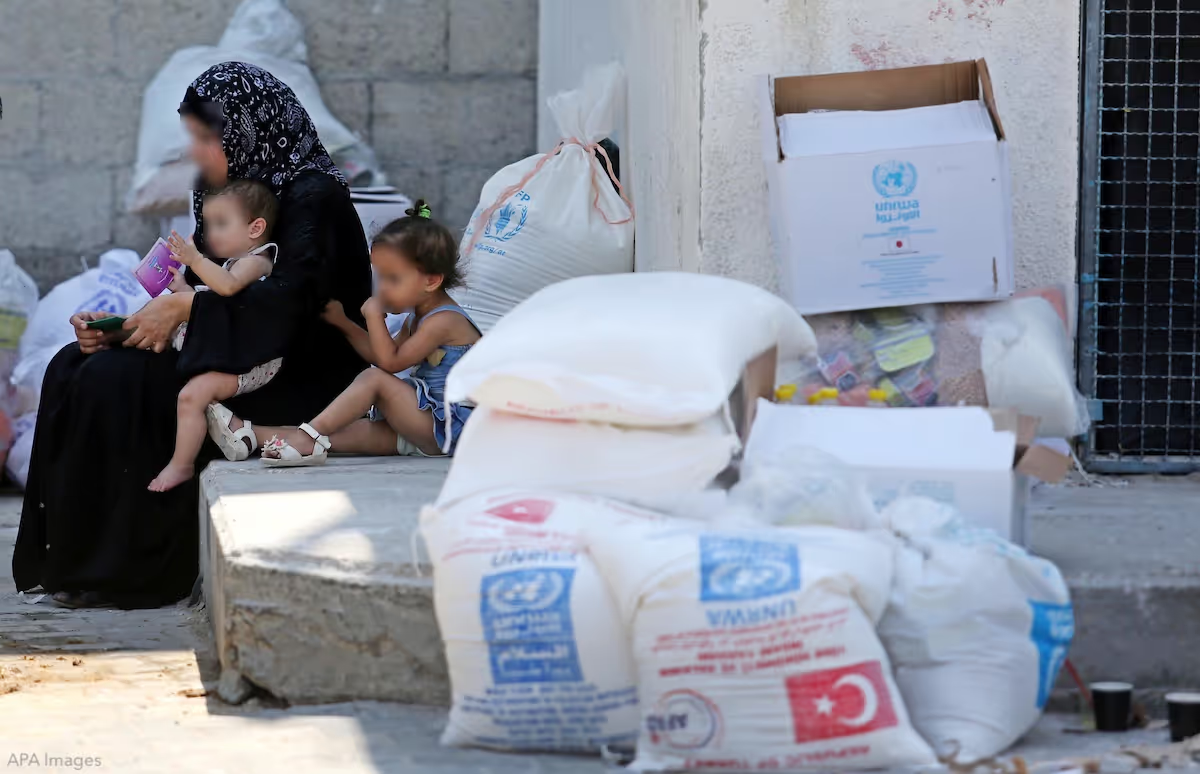
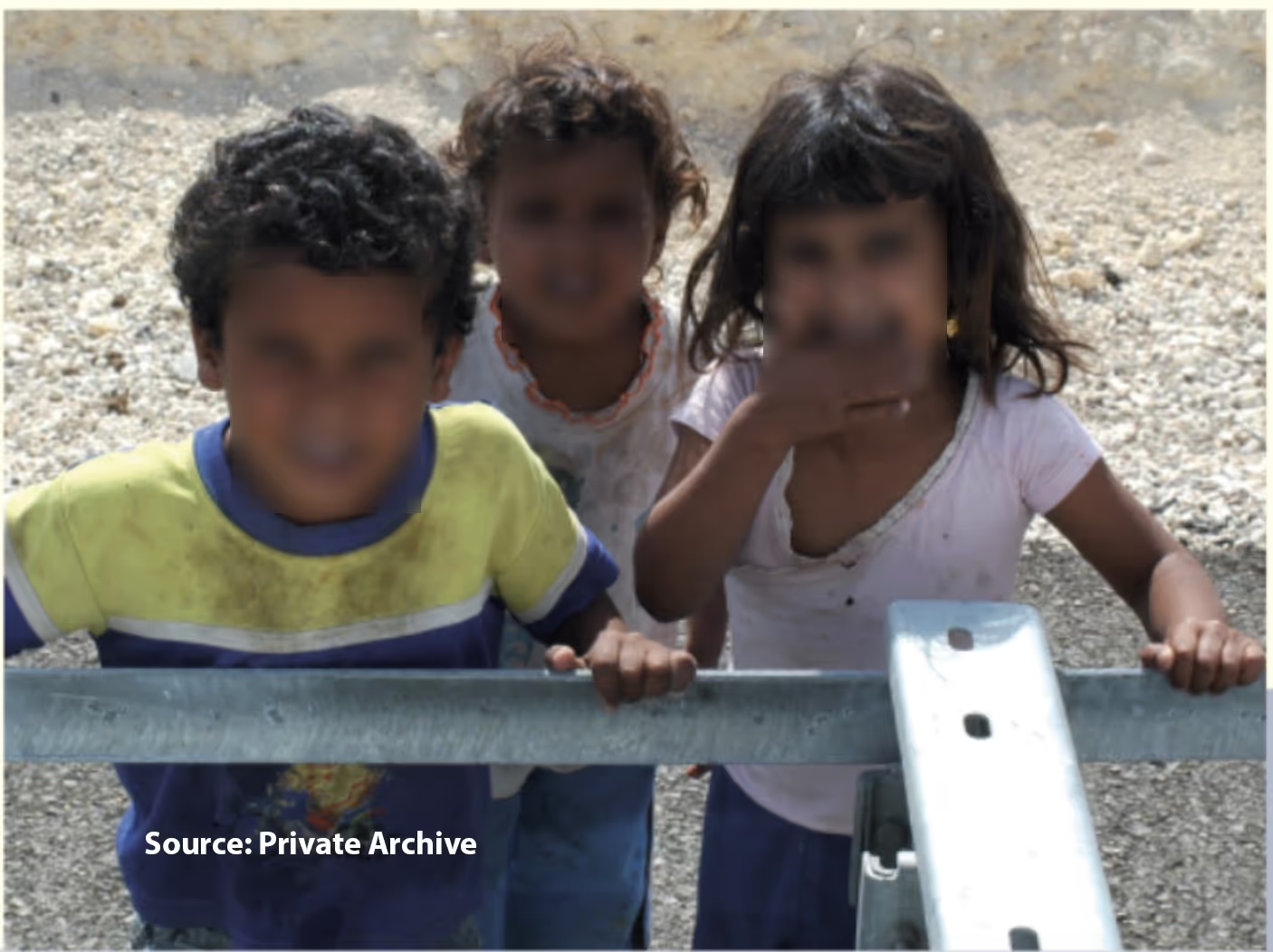
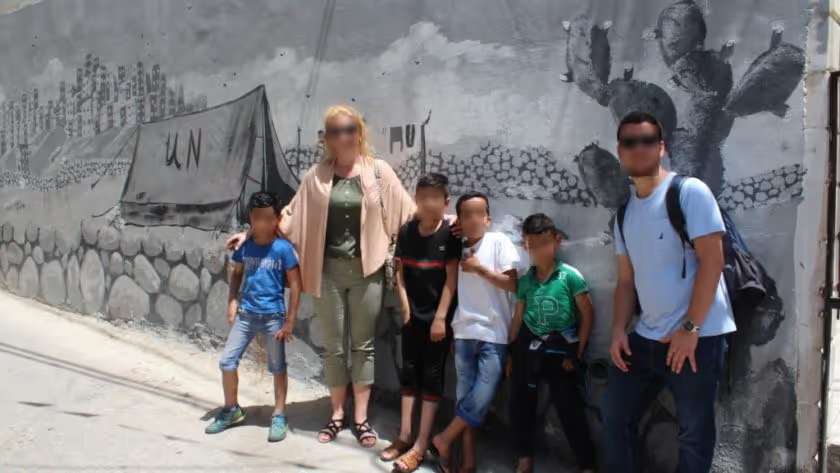
From left to right: APA/ Retrieved from Al-Shabaka
Retrieved from a brochure of German "peacebuilding" organisation
Retrieved from an old page of Go Palestine
Reducing the Palestinian struggle to a mere humanitarian crisis strips it of its political root causes and turns a liberation struggle and a quest for dignity into a matter of charity.
The issue is not in stating that there is a humanitarian crisis and that Palestinians are reliant on aid—these are facts—but rather in the failure to acknowledge and address the root causes. Poverty, underdevelopment and starvation are man-made; and Israeli colonialism, military occupation, apartheid and blockade must be held to account for producing and perpetuating this reality.
This framing has significant implications for policy and funding decisions as it channels resources toward temporary, band-aid-like solutions; rather than structural change. This maintains an endless cycle of demolition and reconstruction where destroyed schools, hospitals and entire regions are repeatedly rebuilt with international aid; only to be destroyed again in the next round of Israeli attacks, because the root causes remain ignored. Paradoxically, many of the same governments and institutions funding reconstruction and humanitarian aid simultaneously provide military, economic and diplomatic support to Israel; facilitating the very destruction they claim to oppose.
The aid and development sector frequently pursues Western, neo-colonial narratives of “resilience” as a central theme. This advocates individual coping, survival and self-reliance as desirable traits while ignoring broader systems of oppression that create and sustain collective vulnerability. Crucially, the resilience narrative overlooks sumoud, a foundational Palestinian concept of collective steadfastness rooted in connection to the land, refusal to leave, communal cohesion, and active resistance against colonial domination.
*Explore more on the danger of fetishising Palestinian sumoud in this section
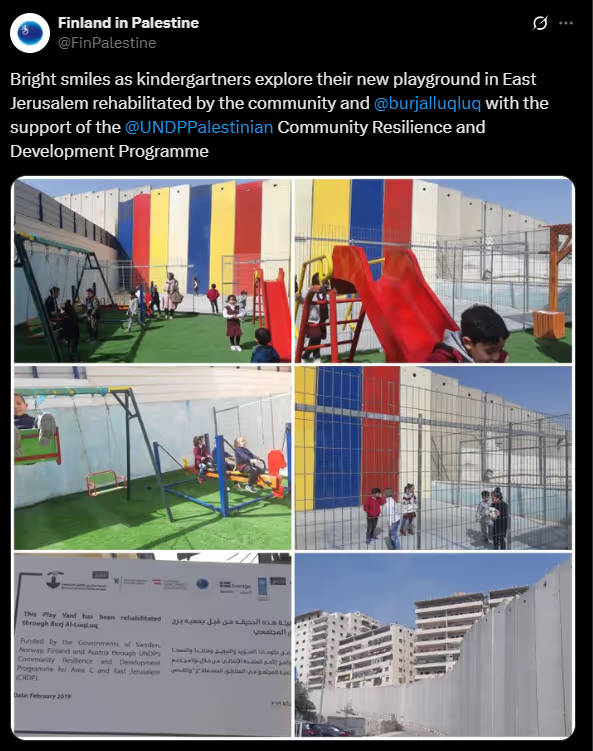
The humanitarian narrative also perpetuates racist and dehumanising stereotypes. By portraying Palestinians as perpetually in need of aid without addressing the root causes, the narrative suggests that Palestinians are “backwards”, incapable of self-sufficiency, and unable to develop, which maintains the white saviour complex. Visual depictions that emphasise dirtiness, desperation and poverty reinforce these harmful narratives, while the expectation that "beneficiaries" express gratitude in promotional materials echoes colonial dynamics.
This framing often disproportionately tokenises women and children as symbols of passive victimhood, stripping them of their political agency and active roles in the struggle for freedom, while simultaneously dehumanising Palestinian men. Many of these representations are designed to promote organisations' work and secure funding. In our research, participants in the Khan Al-Ahmar focus group expressed frustration with development sector communications that prioritise donor reporting and fundraising over genuine impact.
Ultimately, these narratives not only undermine Palestinian dignity and agency but also strip them of their right to self-determination, reducing a political struggle for liberation to a series of disconnected, apolitical crises.
The modern “terrorism” framework was institutionalised by the 1960s, as Western colonial regimes and right-wing dictatorships weaponised it to delegitimise communist, socialist, anti-imperialist and national liberation movements. For example, this narrative enabled US-backed military dictatorships across Latin America to brand leftist political opposition as “terrorists”, while carrying out mass executions, enforced disappearances and torture. Similarly, national liberation movements in Palestine, Algeria, South Africa, Ireland and Vietnam were deemed “terrorist organisations” by colonial rulers and their allies in order to justify colonial oppression and hinder national independence.
As communism waned with the collapse of the Soviet Union in the 1990s, the global “terrorism” narrative shifted to focus on a new "global enemy"—Islamic fundamentalism—especially after the 9/11 attacks in the United States. The “terrorism” framework has since been instrumentalised by Western powers to justify military occupations and atrocities across the world, including in Iraq, Afghanistan, China and Chechnya—all under the banner of the "War on Terror."
In Palestine, such a narrative has existed since the establishment of the Israeli settler-colonial state, serving to criminalise and suppress Palestinian resistance across all political affiliations and forms of struggle. This framing has been central to Israel’s justification of its oppressive policies including assassinations, torture, blockades, military aggressions, collective punishment, administrative detention and punitive home demolitions—presenting them as “counter-terrorism” measures or “self-defence”.
The narrative has also been institutionalised through official criminalisation under the legacy of British colonial laws and Israel's own laws, particularly since the rise of the Palestinian national liberation movement in the 1960s. Since then, Israel officially designated the Palestine Liberation Organisation and most of its affiliated political factions—including the leftist Popular Front for the Liberation of Palestine (PFLP)—as “terrorist organisations”, securing support from Western allies for these classifications. As newer political parties like Hamas emerged in the 1980s, they were also designated as “terrorist” entities. Over time, these designations expanded to include student groups, and human rights and civil society groups.
The concept of “terrorism” has been weaponised to suppress and delegitimise national liberation and socialist movements, while also reinforcing state power over Muslims, people of colour, and other oppressed communities. It masks the imperialist violence of states claiming to act in the name of “counter-terrorism”.
In 1986, Benjamin Netanyhu, then Israeli ambassador to the UN, edited and compiled a book of essays, “Terrorism: How the West Can Win”, that championed and influenced highly the spread of the “terrorism” framing and trope. Edward Said wrote a review.
This “terrorism” narrative entrenches a harmful dichotomy: "us versus them." In this binary, the "global enemy and threat" is contrasted with the "civilised," who are positioned to contain it. On one side, there are Judeo-Christian, white “democracies;” and on the other, “terrorism-breeding hubs”, often Muslim, Arab, and Brown, framed as “barbaric, uncivilised and inherently violent”.
The "terrorist" narrative delegitimises Palestinian resistance by decontextualising anger, demonising and invalidating legitimate responses to Israel's colonial and occupation systems. It portrays Palestinians as “irrational, barbaric, and inherently violent”. Palestinian men are most often targeted by this narrative, while only certain groups—typically children, women, and the elderly—are labelled as “innocent civilians.”
This creates a hierarchy of lives in which colonial violence against so-called “terrorists” is normalised and justified, while attacks on “civilians” are afforded some sympathy or dismissed as unavoidable “collateral damage.” Such dehumanising categorisations reinforce the very narrative Israel uses to legitimise genocide, mass killings, and systemic dispossession.
Colonial occupiers, including Israel, have long claimed a “right” to defend themselves from the resistance of colonised peoples, often labelling it “counterterrorism”, even when committing genocide. By adopting the narrative that colonial violence is acceptable, necessary and legitimate for Israel's security, the international media and political establishment validate Israel's ongoing aggressions and colonial oppression rather than reporting ethically and adopting concrete actions to stop it.
Gaza is an important microcosm of this phenomenon. Rather than being recognised as one of the most densely populated places in the world—where over two million Palestinians, the majority of whom are refugees and under the age of 30, have been colonised for eight decades and besieged for nearly two decades—it is consistently framed as a hub for “terrorism” and a security threat to be contained. This framing conveniently obscures the ongoing, systematic military aggressions against the tiny enclave; including periodic large-scale bombardments, mass killings, the destruction of homes, schools, hospitals, and infrastructure, as well as the profound psychological trauma inflicted on its population. This narrative aligns seamlessly with the repeated assertions by Western allies of Israel’s so-called “right to defend itself.”
The broader implications of adopting the “terrorist” narrative are chilling, resulting in direct threats against Palestinians and their allies; including sanctions, criminal prosecutions, surveillance, forced closures of civil society groups, travel restrictions, job terminations, deportations, stigmatisation and financial and political isolation. Media complicity in spreading Israeli disinformation, while suppressing Palestinian narratives, has also reinforced hate crimes against Palestinians, Arabs and Muslims.
*Explore more on the repression of Palestinian advocacy in this section
Linking Palestinian resistance to “terrorism” in the international consciousness further ingrains the idea that Palestinians are “terrorists”, in contrast to a handful of peace-making individuals. Comparatively, Israeli settlers who are living on stolen land and committing daily colonial attacks on Palestinians are simply referred to as a handful of “extremists” by mainstream media and the political establishment. This notion of extremism is flawed:, it implies that the majority of Israelis acknowledge Palestinians and their rights, and only a minority support the ethnic cleansing of Palestine. In fact 73% of Israelis polled in March and April 2024 believe Israel’s genocidal war in Gaza, which had claimed the lives of over 32,000 Palestinians, including over 14,000 children at the time, is “about right” or “not far enough”.
In all oppressive contexts, colonial and imperial powers attempt to justify their oppression by portraying the resistance, refusal, and defiance of the oppressed as “irrational, violent, uncivilised, and inherently opposed to peace”.
In Palestine, this narrative has long been central to Zionist propaganda to justify the colonial project by depicting Palestinians as rejecting supposedly generous offers of “modernity and peace”. This racist discourse has been used since the British colonial period when Palestinians rejected the 1917 Balfour Declaration, and the partition of Palestine in the 1937 League of Nations’ Peel Commission plan, and the 1947 UN plan.
The Zionist narrative of “rejectionist” has portrayed Palestinians and Arabs as in opposition to “peace” and negotiations, as well as “inherently violent and hateful”, while Israel ethnically cleansed the majority of the Palestinian people during the 1948 Nakba, and later expanded its occupation to the remainder of Palestine in 1967, along with other Arab territories.
A key distillation of this discourse is a racist quote, penned in 1973 by then Foreign Minister Abba Eban, that “The Arabs never miss an opportunity to miss an opportunity.” Variations of this trope have persisted through inaccurate or decontextualised portrayals of failed “peace negotiations”.
Contemporaneously, Palestinians have been shaped by the "Oslo Peace Accords", the series of agreements signed in the early 1990s between the PLO and Israeli government, which resulted in a protracted and permanent failed "peace process". While, the percentage of journalists, reporters, analysts and diplomats who have read the Oslo treaties was not measured for this study, responses from our focus groups tell us that few internationals recognise or have knowledge of its details and failures. Despite this, many continue to promote the framework of “peace negotiations” as a viable path forward even as newer generations of Palestinians, shaped by the consequences of Oslo, increasingly reject this paradigm. This has only further entrenched the narrative of Palestinians as rejectionists, casting their opposition to failed processes as hostility with their so-called “Israeli neighbours.”
This rejectionist discourse persists in mainstream political and media establishments regardless of the crimes committed by the colonial regime as evident in the ongoing genocide; Hamas are now framed as the rejectionists of ceasefire deals.
Mohammed El-Kurd uses satire to deconstruct the question, “Why don’t Palestinians want peace?”
Source: Mondoweiss
The notion that Palestinians consistently reject "peace" is inherently racist. It dehumanises them by portraying their defiance as irrational, radical and opposed to generosity. By stripping their refusal of context, the legitimacy of their struggle for justice, liberation and rights is denied.
The discourse erases the colonial nature of the Israeli regime and the asymmetrical power dynamics between the colonised and the coloniser in line with the "two-sided conflict" narrative.
Within this decontextualisation and false equivalence, negotiations are upheld as the path to “peace”, even when they are fundamentally flawed. Instead of dismantling systems of oppression and ensuring accountability, rights and reparations, the oppressed are expected to accept compromises that maintain injustice and colonial control.
This discourse overlooks how these agreements and negotiations have served to partition and fragment the land and its people, normalise the transfer of Palestinian land to European settlers, and continue to deny Palestinians their right to self-determination and sovereignty over their land.
The narrative omits Israel's bad faith in implementing "peace negotiations”. Time and again, when Palestinians have agreed to negotiations, Israel has not only violated them but has also taken the opportunity to deepen its colonialisation, obstructing any meaningful path to a just peace.
This is evident in the continuation and expansion of colonisation after the Oslo Accords; and in Israel’s repeated violations of ceasefire agreements with Hamas and Lebanon during the ongoing genocide.
Such tropes strip Palestinians of their agency, portraying them as inept, unable to construct socioeconomic systems and make political choices that are supposedly good for them. Ultimately, it delegitimises all forms of Palestinian resistance by expecting submission and compromise in the face of ongoing oppression.
This narrative serves as a tool of victim-blaming. It paints Palestinians as responsible for the oppression and violence waged against them, while obscuring Israel’s systematic refusal to any deal that would protect Palestinians’ rights and its inherent bad faith in implementing such agreements.

Israel masters the tactic of the oppressor’s benevolence; where after stealing land, occupying, dispossessing, bombing and committing genocide, they perform symbolic gestures framed as generosity and good faith.
Examples include:
Israel presents itself as rational and operating with good faith, while Palestinians confronting such hypocrisy and gaslighting are portrayed as perpetual complainers.
One of the most common problematic framings of the Palestinian people is the tendency to portray them one-dimensionally. These reductionist representations often depict Palestinians solely as victims, fighters, violent, steadfast and/or heroes. While some of these portrayals may come from good intentions and are not necessarily false or negative, they can contribute to dehumanising and exclusionary narratives when adopted as the sole framing.
People communicating may employ more than one portrayal simultaneously; however, our research indicates that some sectors communicate one-dimensional narratives more frequently than others.
Across mainstream media and political discourse, Palestinians are often portrayed as “inherently violent”, angry, and, at worst, “terrorists”. This narrative is reinforced by a deliberate focus on moments of Palestinian resistance—particularly during protests and armed struggle—and by the overrepresentation of Palestinian men, typically depicted in large, faceless crowds wearing kuffiyehs, throwing stones, or burning tires.
Simultaneously, this framing fixates on so-called moments of heightened violence and escalations, such as military raids and killings, ignoring both the root causes and the fact that everyday life under Israeli colonialism is inherently violent for Palestinians.
Another oversimplified harmful narrative is the depiction of Palestinians as passive victims. This narrative emphasises Palestinian suffering while largely ignoring its root causes: Israeli colonialism, occupation, and apartheid. At the same time, it sidelines Palestinian resistance and Sumoud (steadfastness), reducing the struggle to one of helplessness and stripping Palestinians of political agency and dignity.
Within this framing, certain Palestinians are overrepresented—those who fit the "ideal victim" mold according to ethnocentric standards: individuals perceived as innocent, apolitical, forgiving and removed from anger or resistance. In this colonial logic, it is often women, children, the elderly and people with disabilities. Their stories are frequently forced into personal accounts of pain, devoid of political narratives or agency.
*Explore more on the “ideal victim” narrative in this section
While oversimplified portrayals of Palestinians as violent or victims are often deliberate and institutional, similarly reductionist portrayals often exist within Palestinian and solidarity spaces despite good intentions. In these spaces, Palestinians are frequently romanticised, and depicted as legendary heroic figures of resistance and sumoud (steadfastness). Within this narrative, Palestinians are glorified as eternal symbols of defiance, capable of enduring and resisting whatever oppression befalls them.
Oversimplified narratives fail to capture the diversity and complexity of Palestinian identities and experiences, where suffering and resistance intersect. Further, reliance on these oversimplified narratives reinforces harmful understandings of and reactions to the Palestinian cause—from demonisation and fear to pity, idolisation and romanticisation. In all of these portrayals, Palestinians are confined to reductive stereotypes, which serve to further their dehumanisation.
Romanticised portrayals that depict Palestinians solely as heroes or symbols of sumoud (steadfastness) have several pitfalls:
Mohammed El-Kurd on the risks of the resilient narrative
Source: Al Jazeera English
Portrayals that reduce Palestinians—particularly men—to violent and angry crowds overlook the reality that these men are compassionate, loving and affected by the suffering they endure. Palestinian men are framed as “inherently violent”, through decontextualised portrayals of so-called escalations that conceal the root causes of Israeli violence and the broader spectrum of Palestinian resistance—such as advocacy, civil disobedience, boycotts, and legal efforts. These portrayals leave audiences with a sense of fear and alienation which is then used to justify further Israeli violence. This reinforces orientalist tropes of the “terrorist”, angry, irrational Arab male; further dehumanising and demonising them.
The story of Khalid al-Nabhan, a Palestinian grandfather who lost his granddaughter Reem to Israel’s genocide in Gaza and was later also killed, is a powerful example that shattered racist reductionist stereotypes. For many viewers shaped by biased discourse, it was striking to see a Palestinian man—dressed in traditional clothing, a turban, with a long beard—tenderly holding his baby granddaughter, calling her “the soul of my soul,” and weeping as he held on to her earrings. The surprise this story evoked underscores a troubling reality: audiences are conditioned to view Palestinian men, and Arabs and Muslims more generally, through orientalist frames of “terrorism”, anger and violence, stripped of emotion, tenderness and humanity.
Lara Elborno addresses the dehumanisation of Palestinian men
Source: Double Down News
The “ideal victim” trope exists for all oppressed people. It suggests that certain prerequisites must be met for people of colour to earn sympathy, representation and justice. To be “humanised”, they must be sanitised and presented as relatable and agreeable to Western audiences.
For example, a Black victim of police brutality is defended through being portrayed in angelic terms, highlighting their sobriety, non-violence and kind personality; suggesting that only if the victim embodies these qualities and values are they worthy of life and justice.
This narrative is evident in the Palestinian case. To receive attention and sympathy, Palestinians are expected to be kind, polite, forgiving, peaceful—stripped of anger and nationalist aspirations—even as they endure colonial oppression. They are expected to highlight progressive lifestyles, honourable professions, foreign passports and Western appearance while distancing themselves from Islamic or conservative traditions. Within this framing, Palestinian men are especially dehumanised, forced to constantly prove their innocence in order to be deemed worthy of recognition.
Mohammed El-Kurd on the perfect victim
Source: TRT World
This harmful narrative is perpetuated by dominant communication apparatus, including media, the political establishment, entertainment and culture industries. Both solidarity groups and Palestinians themselves have consciously and subconsciously internalised this narrative in an attempt to push for coverage and justice.
Ahed Tamimi
Ahed is a Palestinian youth activist from the village of Nabi Saleh in the occupied West Bank, which has been subject to intense Israeli colonisation plans and constant military raids. A video where she slapped a soldier went viral in 2017 and Ahed Tamimi became an international symbol of Palestinian resistance. She was arrested and tried in a military court, and served an eight-month sentence, while still under 18. Her case received great attention in the international media.
Some Palestinian participants in our research and Palestinian online comments at the time felt that Ahed’s Tamimi age, gender and physical appearance (a young, blonde girl) was an important factor for the support and connection that she received from the international media. Journalist Ben Ehrenreich explains this bias to whiteness in Ahed’s case as follows:
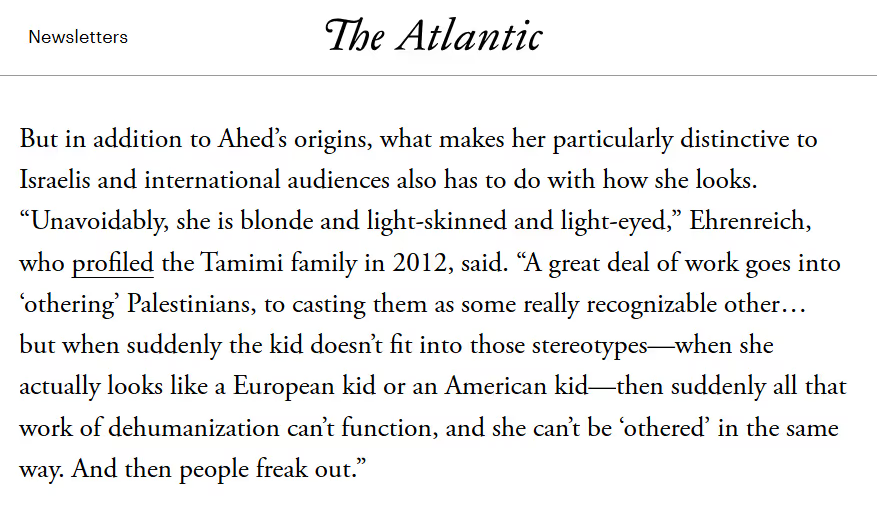
Shireen Abu Akleh
Shireen was a renowned Palestinian journalist who was killed by Israeli forces while covering a military raid in Jenin, in the occupied West Bank, in May 2022. For many journalists, politicians and commentators, it was important to underline that Shireen was a woman, a US citizen, and of Christian faith, in order to gain more widespread outrage for her murder by an occupying military force.
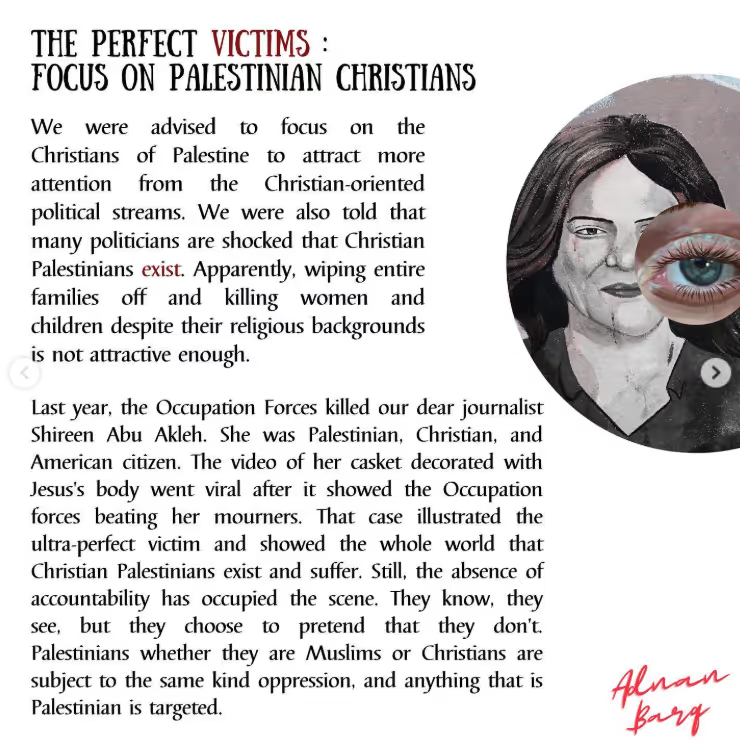
The "Progressive Palestinian"
In our research we challenged the “progressive Palestinian” framing—which may not immediately seem harmful. We used a picture of Palestinians having a drink in a bar in Ramallah city. For our Palestinian participants based in Palestine, they felt that these aspects of Palestinian life are being made into a spectacle or token for Western approval. In the focus group held in the rural community of Khan al Ahmar, participants thought that picture was erroneously included, and that it was actually taken in another country.
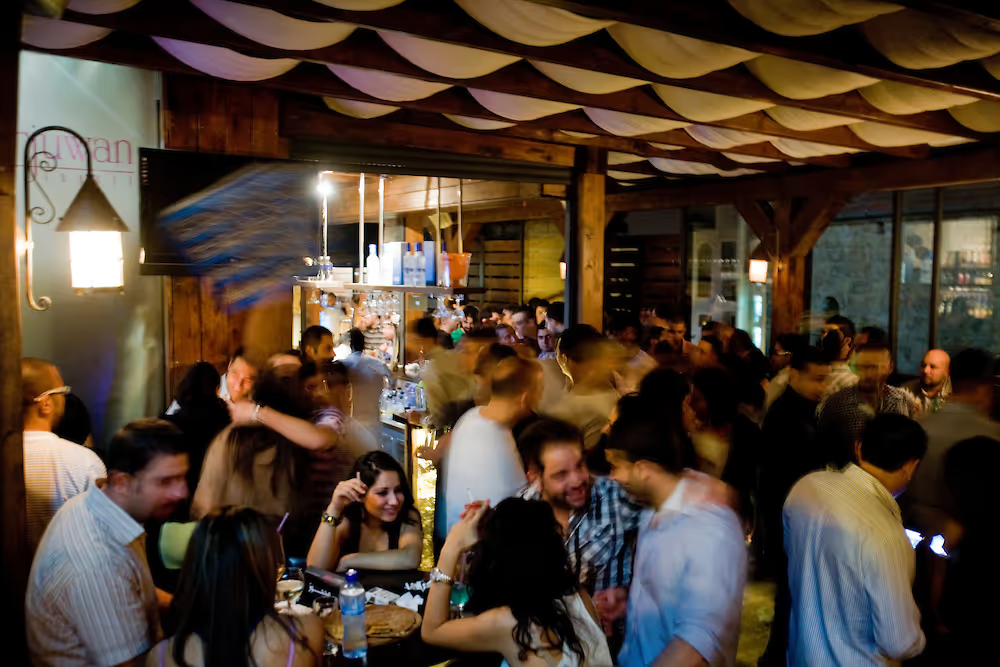
On the other hand, other respondents, particularly Western participants, saw these images as a way to help international audiences relate more easily to Palestinians and have a positive view beyond expected stereotypes. For them, this specific Palestinian-ness is perceived as a corrective to the negative framing that some people initially have about Palestinians.
This contrast shows how internationals reinforce the “ideal victim” narrative.
Demanding that Palestinians prove their humanity in order to gain empathy and justice is not only racist and dehumanising—it reinforces the very imperial systems that imposed these expectations in the first place, while shaping public opinion and engagement through those same dehumanising terms.
Images, representations and discourse where certain traits are seen more positively (blonde, Christian, alcohol consumption, non-violence) suggests that other Palestinians who do not fit these lifestyles, appearances or values are less deserving of freedom.
Humanising Palestinians by overemphasising any common points they may have with Western traits and norms, or conditioning empathy on those norms, narrows the scope of who is seen as worthy of justice. This creates a hierarchy of suffering where the Palestinians who do not fit these expectations are abandoned. These —Palestinians are most often the most underprivileged within the society, that is: those who are most directly affected by Israeli colonisation and who bear the heaviest costs for their resistance.
When Palestinians are only seen as “human” if they appear calm, peaceful or agreeable then their natural reactions to oppression—like anger or the desire for revenge—are dismissed as unacceptable. This restricts how they are allowed to express pain and resist injustice. In effect, it dictates which emotions are “permissible” and which are not, denying Palestinians the full range of human response to violence and colonisation.
When Palestinians are pressured to fit an “ideal victim” image, the burden is placed on them to prove their humanity, while diverting attention away from the real issue: the violence of the oppressor and the colonial project itself. The focus must remain on the systems of domination, not on whether the victims appear “perfect” enough to deserve empathy.